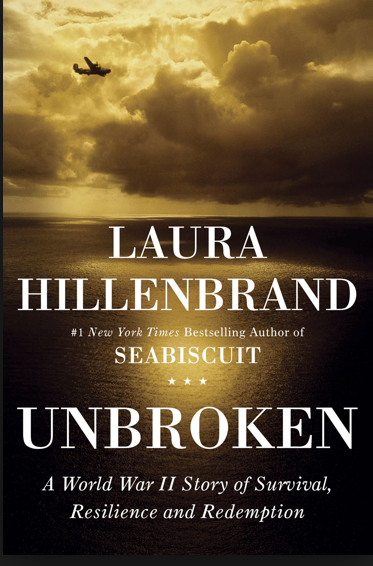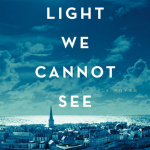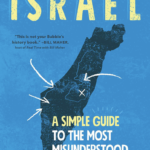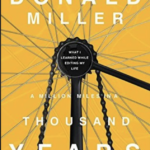Unbroken by Laura Hillenbrand
Unbroken by Laura Hillenbrand– I read this book and wrote this review prior to seeing the movie by the same name. I do plan to see it and will review it in FilmRap.net. (click here to see review)
(click here to see review)
Louie Zampereini was an Italian-American boy from a poor family who was raised in Torrance, California. He was a rough and tumble kid who had a propensity for stealing things and getting into trouble. He was fast on his feet and ultimately developed into a record breaking track star who participated in the 1936 Olympics in Berlin, Germany. When World War II came about he signed up for the Army Air Force and became a bombardier. Early in the war his plane on a mission crash-landed in the Pacific Ocean where he and two other airman survived in rafts for 47 days as they drifted 2000 miles. During this time they battled starvation, dehydration, hungry sharks and storms as well as Japanese planes that strafed them with machinegun fire. If you think this was bad you should see what happened after they were rescued at sea…by the Japanese and made prisoners of war (although they were never treated according to the Geneva Convention rules for POWs). We see how things were absolutely terrible and how demeaning the treatment of American Prisoners was, ironically clearly much worse than the German Nazis reportedly dealt with their American captives. Louis was apparently treated much more savagely once he was recognized as an Olympic track star.
Being a member of the Silent Generation and having come of age in the decade following WWII, I grew up as a kid reading all sorts of stories and seeing all the movies about this war. Even now as an older guy I am still drawn to a book such as this one. I am sorry to say that reading about the awful treatment by the Japanese of the helpless American prisoners, my old negative prejudiced feelings about the Japanese people were awakened. I know these are irrational and are related to issues from a previous generation. Although a few kind guards were mentioned, there clearly was, at that time, an institutionalized culture of cruel, vicious treatment of the Americans who were starved, tortured and made to do slave labor. We see these atrocities through the eyes of Zamperini who was officially considered dead by his government although his family seemed to have never given up hope for him. We trace his ordeal as he is moved to various prison camps and was never registered with the Red Cross as a POW although that was the usual procedure mostly followed by the Japanese who nevertheless hid their maltreatment of their captives.
The book does not end with his liberation at the end of the war. It follows Zamperini’s reintegration into civilization and his seeming resilience but also his very dark and destructive periods, which were almost as bad as you can imagine. The author Laura Hillenbrand, who previously wrote the best seller Seabiscuit had access to diaries, newspaper articles, radio and television interviews and a gigantic trove of people to interview who knew Zamperini in the various phases of his life including those who were imprisoned with him and close family members. She also had the opportunity to interview Zamperini himself more than 75 times and became quite close to him before he died in July of 2014 at the age of 97.
At times the book seems overly repetitious. Perhaps it felt that way because it was so painful. I am not giving away the ending because the title clearly does that but this book is also about the human spirit. As an outsider who didn’t live through his ordeal and didn’t live through this time as an adult, I can only try to get into Louis’ head through this book. When we try to do this, there is a tendency for us to be traumatized. At one point in the book we learn that recently there was a commemorative memorial made by the local Japanese people at the site of one of the camps at which Zamperini spent much of his time. It honored and remembered the prisoners who were there, many of them who had died there. We are also told that there are pictures of six birds flying in the sky as symbols of the memory for 6 of the prison guards who were tried as war criminals and executed! On the day that I am writing this review there is a front page article in the New York Times that discusses the current Japanese Prime Minister Abe and his hope to bring about a change in the Japanese constitution which was written post war by the Americans and forbids Japan from ever going to war again. Time marches on.













